Why is Cardano (ADA) price up this week?
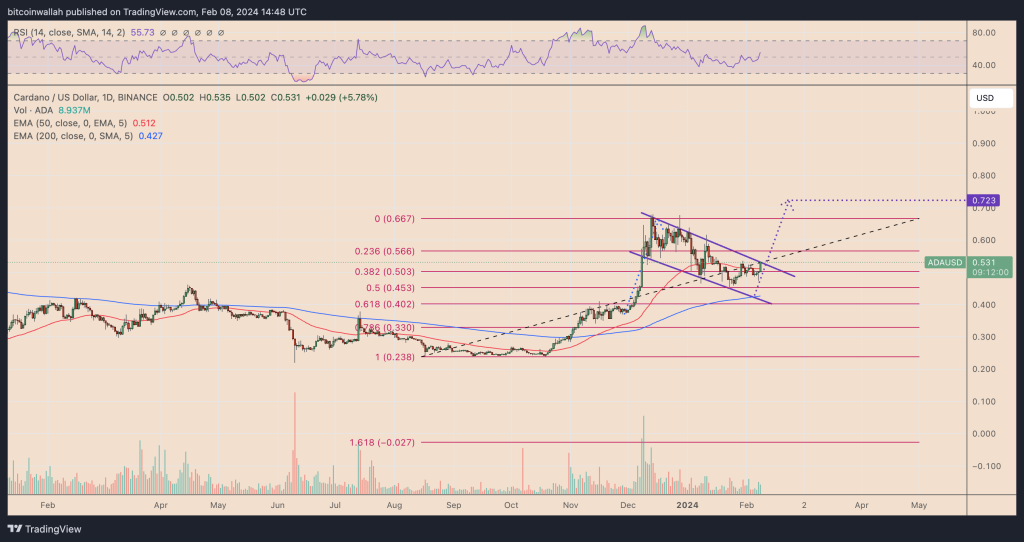
Broader market uptrends and Solana’s network outage have triggered this week’s rise in ADA price.

This week, Cardano (ADA) has experienced a notable rise, rising over 8.5% to reach $0.535 by Feb. 8. The bulk of this weekly appreciation, approximately 6.5%, occurred in the last 24 hours, driven by a confluence of technical indicators, on-chain data, and foundational developments.

Overall market trend pushes Cardano up
Cardano’s rise this week mirrors upside sentiment elsewhere in the crypto market. For instance, Bitcoin (BTC) and Ether (ETH), the leading cryptocurrencies by market cap, have risen by over 4% and 5.25% week-to-date, respectively.
The daily correlation coefficient between Cardano and Bitcoin has remained mostly positive throughout history. As of this week, it was above 0.75.

This uptrend indicates a heightened interest in crypto assets overall, fueled by the U.S.’s recent approval of Bitcoin-based spot exchange-traded funds (ETFs) and the anticipation surrounding Bitcoin’s next halving event in April.
Travis Kling, the chief investment officer at Ikigai, mentions the Federal Reserve’s rate cut policy as one of the major catalysts behind the crypto market rally, which, in turn, is boosting ADA price. He noted:
“A week ago, the market was pricing six cuts starting in March. Last week, [Jerome] Powell told you to go [in] March. Last night on 60 Minutes, he told you three cuts, not six…result? Stocks up. Crypto up.”
Increased on-chain activity
In addition to broader market trends, Cardano’s price rally has recently taken cues from the recent improvements in its network activity.
The total-value-locked (TVL) across the Cardano ecosystem has grown from 660.30 million ADA to 720.91 million ADA in the last 24 hours. A rising TVL suggests more assets being locked in Cardano smart contracts, suggesting growing adoption.

Furthermore, the Cardano price boom in the last 24 hours coincides with a modest rebound in its daily active addresses and daily transactions count.

Solana outage benefits rival Cardano
Cardano’s price rally this week occurred after the news of Solana’s network outage on Feb. 6. Cardano and Solana (SOL) are layer-one blockchain rivals.
There has been a 6.7% increase in ADA’s value compared to SOL since, indicating a possible shift in investor strategy. Adopting a cautious stance, traders appear to be reallocating funds from the Solana ecosystem toward Cardano, seekin safety amid the volatility.

Cardano price technical setup
Cardano’s recent upward trajectory began at a critical support level, identified by the confluence of a horizontal trendline at $0.494 and the lower trendline of ADA’s existing bear flag formation, as shown below.

As of Feb. 8, ADA’s price was eyeing upward continuation toward the flag’s upper trendline near $0.55. However, since bear flags are bearish continuation patterns, the cryptocurrency’s likelihood of undergoing a breakdown is high, with its price target sitting around $0.421.
Related: BTC price nears $45K amid warning Bitcoin leveraged traders in control
Should such a breakdown occur, by February’s end, ADA’s targeted price level could potentially adjust to around $0.421, down approximately 20% from current price levels.
ADA’s bull flag setup
The bear flag downside target is also near the lower trendline of ADA’s broader descending channel pattern (purple), which resembles a bull flag, as shown below.

This bull flag shows potential for ADA price to rise toward $0.72 by March or April.
This article does not contain investment advice or recommendations. Every investment and trading move involves risk, and readers should conduct their own research when making a decision.


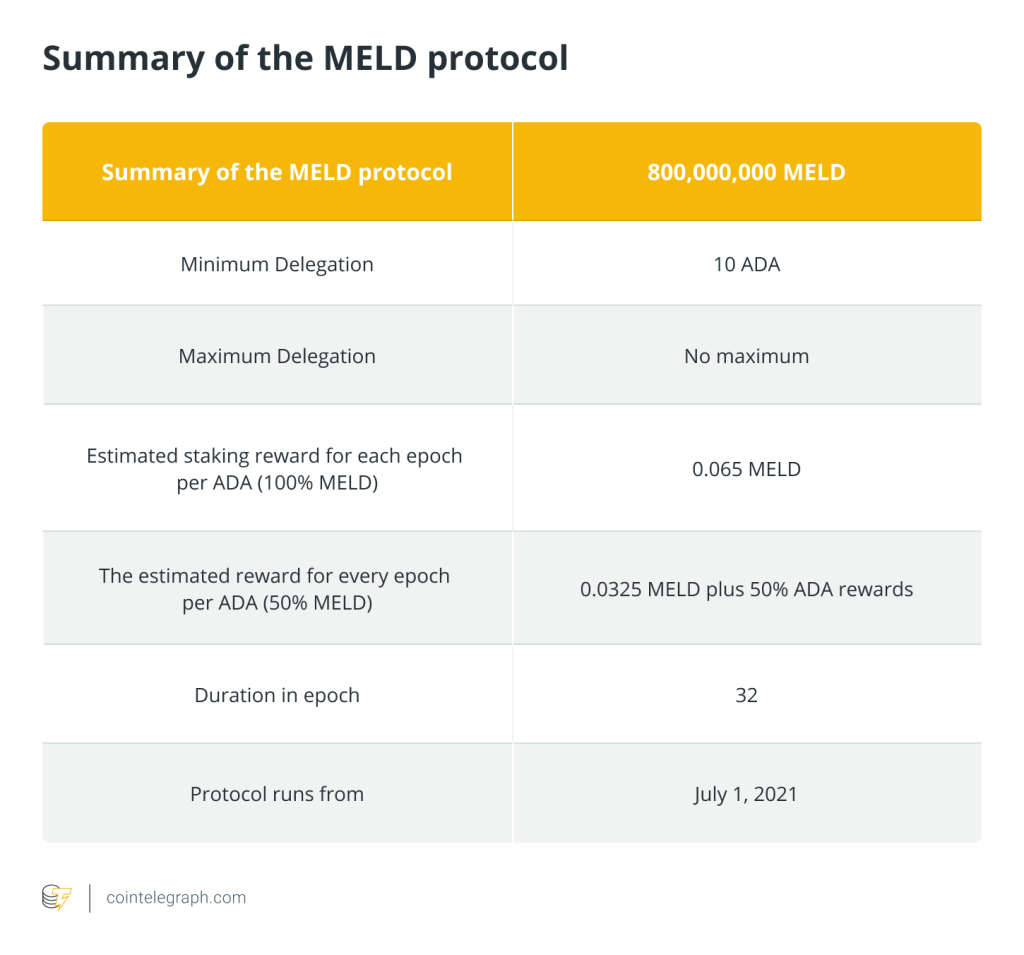
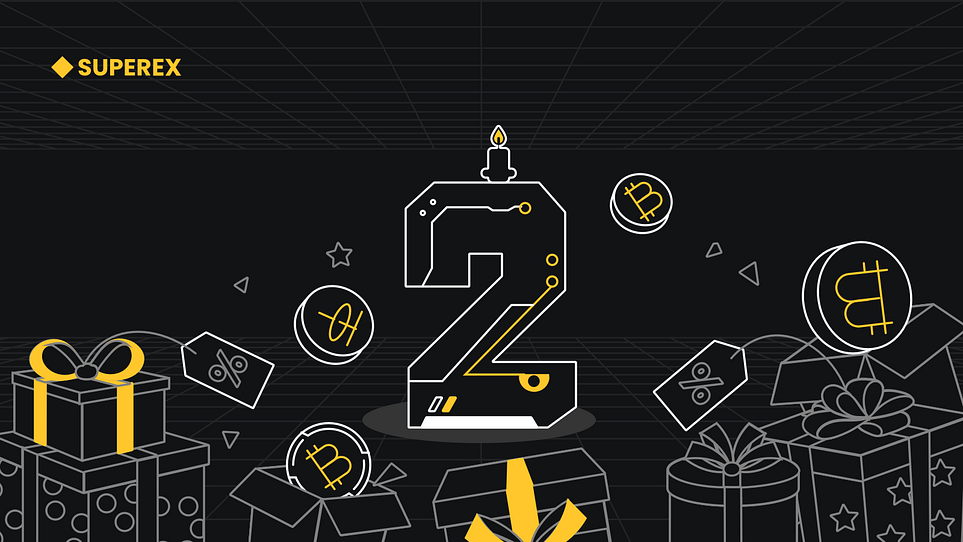
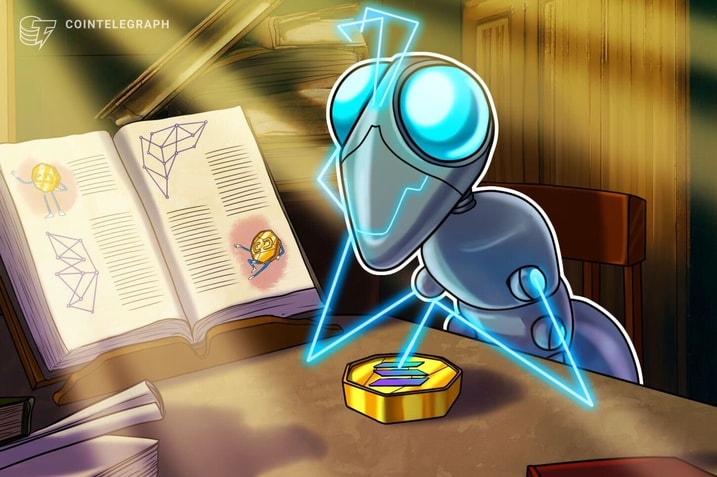
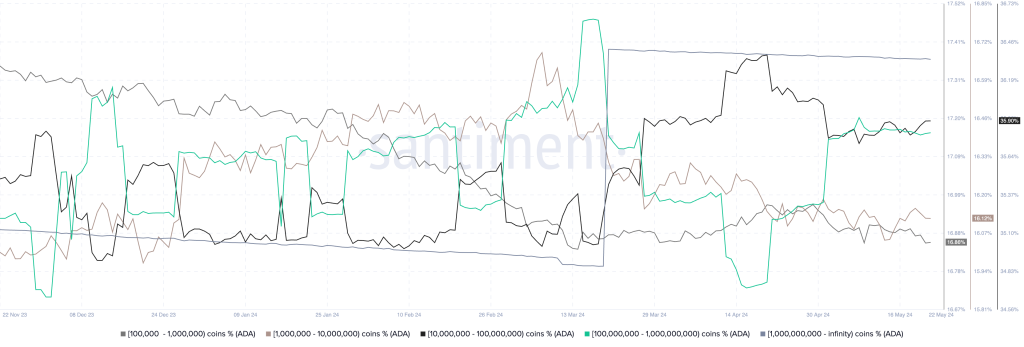
… [Trackback]
[…] Read More on that Topic: x.superex.com/academys/markets/4268/ […]
… [Trackback]
[…] Info on that Topic: x.superex.com/academys/markets/4268/ […]
… [Trackback]
[…] Info to that Topic: x.superex.com/academys/markets/4268/ […]
… [Trackback]
[…] Info on that Topic: x.superex.com/academys/markets/4268/ […]
… [Trackback]
[…] There you can find 13720 additional Info to that Topic: x.superex.com/academys/markets/4268/ […]
… [Trackback]
[…] Find More Info here on that Topic: x.superex.com/academys/markets/4268/ […]
… [Trackback]
[…] Find More here to that Topic: x.superex.com/academys/markets/4268/ […]
… [Trackback]
[…] Here you can find 62977 additional Information to that Topic: x.superex.com/academys/markets/4268/ […]
… [Trackback]
[…] Information to that Topic: x.superex.com/academys/markets/4268/ […]
… [Trackback]
[…] Info to that Topic: x.superex.com/academys/markets/4268/ […]
… [Trackback]
[…] Find More on to that Topic: x.superex.com/academys/markets/4268/ […]
… [Trackback]
[…] Find More here on that Topic: x.superex.com/academys/markets/4268/ […]
… [Trackback]
[…] Here you can find 51696 additional Info on that Topic: x.superex.com/academys/markets/4268/ […]
… [Trackback]
[…] Find More to that Topic: x.superex.com/academys/markets/4268/ […]
… [Trackback]
[…] Find More here to that Topic: x.superex.com/academys/markets/4268/ […]
… [Trackback]
[…] Info to that Topic: x.superex.com/academys/markets/4268/ […]
… [Trackback]
[…] There you can find 9053 more Info to that Topic: x.superex.com/academys/markets/4268/ […]
… [Trackback]
[…] Find More on on that Topic: x.superex.com/academys/markets/4268/ […]
… [Trackback]
[…] Here you will find 33521 additional Info to that Topic: x.superex.com/academys/markets/4268/ […]